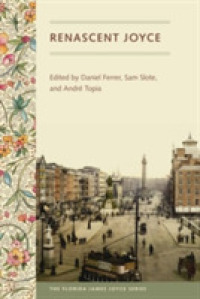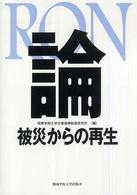- ホーム
- > 洋書
- > ドイツ書
- > Mathematics, Sciences & Technology
- > Physics and Astronomy
- > general surveys & lexicons
Full Description
The contributions gathered here demonstrate how categorical ontology can provide a basis for linking three important basic sciences: mathematics, physics, and philosophy. Category theory is a new formal ontology that shifts the main focus from objects to processes.
The book approaches formal ontology in the original sense put forward by the philosopher Edmund Husserl, namely as a science that deals with entities that can be exemplified in all spheres and domains of reality. It is a dynamic, processual, and non-substantial ontology in which all entities can be treated as transformations, and in which objects are merely the sources and aims of these transformations.
Thus, in a rather surprising way, when employed as a formal ontology, category theory can unite seemingly disparate disciplines in contemporary science and the humanities, such as physics, mathematics and philosophy, but also computer and complex systems science.
Contents
Introduction.- Why Categories?.- Category Theory and Philosophy.- Comments on: Category Theory and Philosophy by Zbigniew Krol.- Are There Category-Theoretical Explanations ofPhysical Phenomena?.- The Application of Category Theory to Epistemic and Poietic Processes.- Asymmetry of Cantorian Mathematics from a Categorial Standpoint: Is It Related to the Direction of Time?.- Extending List's Levels.- From quantum-mechanical lattice of projections to smooth structure of R4.- Beyond the Space-Time Boundary.- Aspects of Perturbative Quantum Gravity on Synthetic Spacetimes.- Category Theory as a Foundationfor the Concept Analysis of Complex Systems and Time Series.








